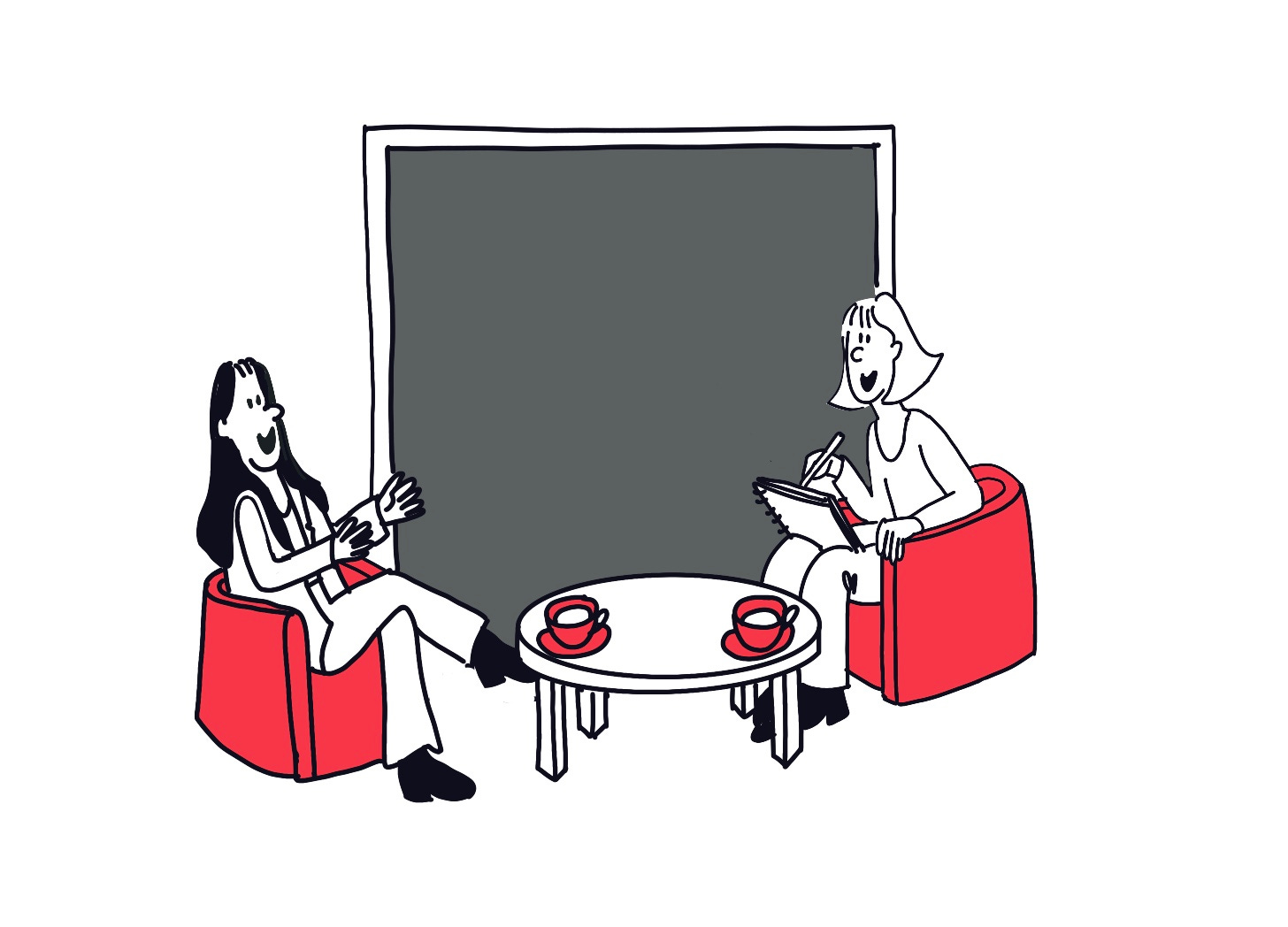Drawing by Tineke Tammes
Would you buy a car without having a test drive?
Would you get new clothes without trying them on? Or at least holding them up in the mirror, turn a couple of times, try to get away from that glaring light that makes your skin look horrible?
You see, nowadays you may say 'Yes!' (as long as you've got a decent way of getting your money back afterwards).
It's not that easy with a job. Or even a career change.
It's a much bigger decision. One that you may get to regret if you don't get it right.
Which is why you want to 'test' your career ideas first. To see if they are a good fit. If you wouldn't regret it the moment you set foot over the threshold. If the day-to-day reality matches what you've dreamed up about it.
And informational interviews is one of the best ways to do just that.
Why informational interviews?
Informational interviews are the easiest and quickest way to get to know if a certain job or field or industry is for you. The point of an informational interview is not aimed at landing you a job, but rather to find out what jobs will fit your expertise, your strengths and your personality.
So, what are they?
Do you want to know if your career ideas are fun? If they are really for you? To hear – from someone who is doing it – what it is really like to work in the career that interests you? To get in contact with someone who can help you land that dream job? An informational interview may well be the way.
An informational interview is a brief meeting between a person who wants to investigate a career and a person working in that career. Usually informational interviews are no longer than 20 to 30 minutes (working people are busy!). Your goal is to find out what jobs you might like. To find out more about the industry. To understand what it is you’ve got to do to land yourself the job that you love.
You may come out of an informational interview finding out that that dream career is not so dreamy after all! That – actually – it is not for you. Or not for you now.
And that’s a good thing! It’s a great way to find out quickly – rather than spending a year being miserable in a job you don’t like!
Or, of course, it might be that you can’t wait to get started. In which case you will have made valuable connections and a potential way to get more information about opportunities.
How do you get an informational interview?
You get an informational interview by networking. Ask your friends. Ask your friends’ friends. Connect with people whose job you like via your friends (or first connections on LinkedIn).
Connect. Introduce yourself briefly. Say something to get them interested in talking to you and why you're really interested in talking to THEM specifically. And then ask for 20 to 30 minutes of their time. Make it as easy as possible for them to interrupt their day and say 'Yes' to meeting you.
What if you don't hear from them at all?
People are busy. Things could be going on for them. They may be abroad, or on holiday. It might be incredibly busy at work. Your email might have got lost in the deluge of emails. Your LinkedIn message might have got buried.
Follow up, sensitively, a couple of times. Sometimes it's persistence and a gentle reminder that can make the difference.
How to conduct an informational interview
The more specific and more to the point you can be in your interview the better. Prepare well and remember that it's likely you'll only be able to get answers to a limited number of questions.
Also, people love talking about themselves. So let them! Your objective is to understand as much about the industry, the work and the job as you can. They are the person to tell you.
Don't ask for a job, even if you're looking for one. Remember, the goal of your interview is to understand as much as possible about the career, the job, the industry and the company as you can. NOT to ask for a job outright.
And finally, when you come to the end of your interview, ask who else they know that might be able to help you.
What to do afterwards
Thank them! Send an email saying how much you enjoyed the interview. What you've learned. Emphasise your strengths if you feel that's appropriate.
The point is that you would want the person you spoke to remember you in a positive way. So that, if there is an opportunity in the company or field they're working in it is YOU that springs to mind.
And finally, do not be attached to the outcome! You may hope for a job, but you should never demand it. You should never expect it. Instead, think of it as 'meeting interesting people'. And in the process learning a lot more about what you want in your ideal job.
That's it!
What even IS an informational interview? Now you know.
🔴🟡🟠
Tineke Tammes is a Career & Creativity Coach and supports professional women in making successful transitions to careers of Freedom, Flexibility and Fulfilment! Besides that she is also a lifelong feminist, part-time portrait artist, never-only-read-one-book-at-any-time reader, and obsessive doodler.
Sign up for this newsletter and get it delivered straight into your inbox every Friday.





